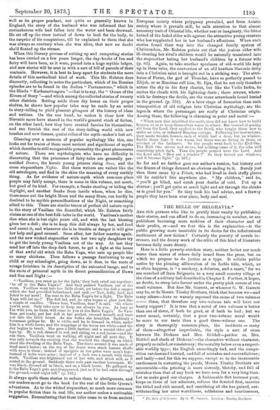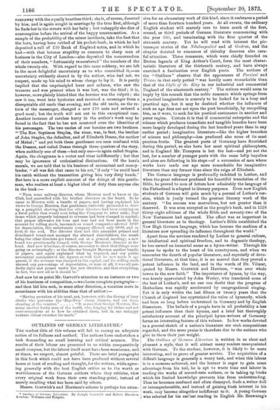THE BELLE OF BELGRAVIA.*
ARE rich persons who like to gratify their vanity by publishing their stories, and can afford to do so, increasing in number, or are publishers becoming more reckless of their character and of their profits, or—and we fear this is the explanation—is the public growing more insatiable in its desire for the infinitesimal excitement of new fiction ? Certainly the poverty of novels in- creases, and the dreary work of the critic of this kind of literature becomes daily more dreary.
Here is a little poverty-stricken story, neither better nor much worse than scores of others daily issued from the press, but oa which we propose to do justice as a type. It solicits public notice by the pleasing alliteration of its feeble title, which, as so often happens, is "a mockery, a delusion, and a snare," for we are marched off from Belgravia to a very small country village at the close of a solitary ball described in Chapter I. Further, it hopes, no doubt, to creep into favour under the pretty pink covers of two small volumes. But does Mr. Garrett, or whoever G. W. Garrett may be, or do Messrs. Tinsley Brothers, think that because we—and many others—have so warmly espoused the cause of two volumes versus three, that therefore any two-volume tale will have our hearty support? It is true that a novel of two volumes is better than one of three, if both be good, or if both be bad ; but we never meant, certainly, that a poor two-volume novel would be more to our taste than a good three-volume one. The story is thoroughly common-place, the incidents — many of them—altogether improbable, the style a sort of cross between Mr. Dickens and Mrs. Riddell—pardon 1.18, Mrs. Riddell and shade of Dickens !—the characters without character,, properly so called, or consistency ; the morality below even a respect- able worldly type ; the English exceedingly bad, and the compo- sition careless and hurried, and full of mistakes and contradictions ;. and lastly—and for this we suppose, except as to the inexcusable carelessness in correcting the proofs, Messrs. Tinsley Brothers are accountable—the printing is more slovenly, blotchy, and full of mistakes than that of any book we have seen for a very long time. Let us make good our charges. A fashionable flirt becomes poor, keeps on three of her admirers, refuses the devoted first, marriea the titled and rich second, and sacrificing all she has gained, not- withstanding her utter worldliness, selfishness and heartlessness, The Belle of Belgravia. By G. W. Garrett. London : Tinsley Brothers. runs away with the equally heartless third; she is, of course, deserted by him, and is again sought in marriage by the true first, although he finds her in the streets with her baby ; but unhappily she dies of consumption before the arrival of the happy consummation. As a sample of the probability of the minor incidents, take the fact that the hero, having been robbed of his pocket-book, in which he had deposited a roll of /10 Bank of England notes, and in which he had—with that intense stupidity so common to sharp men of business in the City of London—also deposited the memorandum of their numbers, "fortunately remembered" the numbers of the whole twenty-six. With regard to this same robbery, we are left in the most delightful uncertainty as to who committed it,—an uncertainty evidently shared in by the author, who had not, we suspect, made up his mind to whose charge to lay it. It is partly implied that the unprincipled lover and seducer, who saw the treasure and was present when it was lost, was the thief ; it is, however, more plainly hinted that the heroine was the culprit ; she saw it too, went into hysterics and received a messenger from a disreputable old uncle that evening, and the old uncle, on the re- turn of the messenger, changed a new £10 note and ordered a
good meal; but the truth will not out in this exceptional case. Another instance of careless hurry in the author's work may be found in the fact that he has not mastered even the identities of his personages. The two uncles of our heroine are two brothers. "The Rev. Septimus Staples, the vicar, was, in fact, the brother of John Staples, the defaulter, and of Elizabeth Deane, the mother of Mabel ;" and yet both these gentlemen are soon confused with the Deanes, and called Deane through three-quarters of the story, when suddenly one of them—but only one—is again called Staples.
Again, the clergyman is a rector and vicar indifferently ; but that may be ignorance of ecclesiastical distinctions. Of the hero's morals, we are told that in his business of accountant and money- lender, "all was fish that came to his net," if only "he could land his catch without the transaction giving him very dirty hands."
But here is a more explicit account of the doings of this gentle- man, who realises at least a higher ideal of duty than anyone else in the book :—
" Then some railway director, whom Moreton used to know at the Club, had quarrelled with his brother directors on tho board. So he came to Moreton with a bundle of papers, and having explained his views to George Moreton, that gentleman forthwith proceeded to draw up a pamphlet showing that the other directors had been carrying on a fiscal policy that would soon bring the Company to utter ruin ; that items which properly belonged to revenue had been charged to capital; that proper allowance for wear and tear had not been made in the account for rolling stock, inasmuch as sound companies allowed 10-99 for depreciation, this unfortunate company allowed only 10.98. and so forth to the end. The director then had this pamphlet printed and distributed broad-cast amongst the alarmed shareholders, the result being the other directors got turned out at a general meeting; a new board was provisionally formed, with George Moreton's director at the head. And now it became, of course, necessary to show that things were going on swimmingly ; so the director brought Moreton another bundle of papers, and again explained what he required, and our public accountant manipulated his figures so well that ho now made it ap- parent, if the revenue was charged to the capital, and the rolling stock showed any per-centage of depreciation, or none at all, it was all per- fectly right and proper under the new direction, and that everything, in fact, was now all as it should be."
And now let us point Mr. Garrett's attention to an instance or two of his hastiness of composition,—we choose complete paragraphs— and then bid him seek, in some other direction, a vocation more in accordance with his abilities than that of author :—
" Having partaken of his meal, not, however, with the throng of busy clerks who patronise the `Bay-Tree' cheap dinners, and eat them
standing at the counter." "It seems that George Moreton, like many another lucky man of the world, who, longing for riches and not over-scrupulous as to how he obtained them, had in one unhappy venture rather overshot his mark."































 Previous page
Previous page